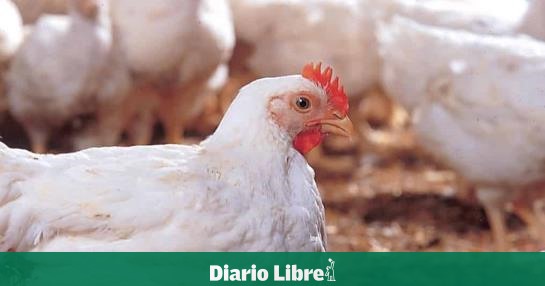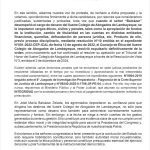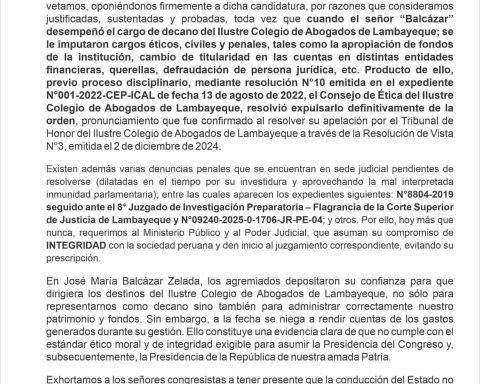The General Directorate of Livestock (Digega) issued a document through which it warns the importers of live birds, poultry products and by-products, which will only be allowed to be imported from authorized countries that are free from bird flu highly pathogenic.
This alert is given as a result of the expansion of outbreaks of bird flu of high pathogenicity in European countries, in several states of the United States and nations of other continents. The document was issued on March 11 and, according to executives from the poultry sector, it was agreed upon.
This scenario unfolds at a time when the productive sectors of the Dominican Republic continue to show their rejection of the Executive Power’s proposal that seeks to establish a zero rate of tariffs to import 67 sub-items with products from the family basket, including chicken meat.
The project received a favorable report from the commission that reviewed it and was sent yesterday to the president of the Chamber of Deputies with the observation of adding to the project that it must be guaranteed that the listed import products comply with the required sanitary and phytosanitary requirements. by the Dominican State.
Of the 67 subheadings that would be applied zero rate, nine correspond to chicken meat in different variables. In recent years, more than 90% of the meat of this bird has been imported from the United States, with which the country has a free trade agreement.
The health alert, signed by the director of Animal Health, Ángela Morillo Poché, indicates that no merchandise can be shipped without first having had the health non-objection issued by the Animal Health Directorate of the Digega, and that the health situation may vary even when the sanitary no objection has been issued and the product has been shipped, so the nationalization can be rejected.
In addition to the alert issued on March 11, 2022, the Digega issued a notice declaring the health defense of cattle in the Dominican Republic to be of public interest.
Explains that the entry of any product or by-product of animal origin into the Dominican territory will not be allowed if, prior to shipment, it does not have the proper sanitary non-objection issued by the General Directorate of Livestockwith the aim of protecting food production and the population.
La Digega informs that all poultry breeders and breeders are given a period of no more than six months so that they can normalize and adapt the primary production centers, better known as farms.
The Dominican Association of Poultry Farmers (ADA) stated yesterday that, if the bill that rests in the National Congress is passed, it would be affecting an industry that generates more than 26,500 direct jobs in the country.
In addition, the poultry industry represents a direct investment of more than 40,000 million pesos nationwide and has an annual production of broilers valued at more than 35,000 million pesos.
For Pedro Brache, president of the National Council of Private Enterprise (Conep), work must be done with the national productive sectors in order to mitigate the impact of the bill in the medium and long term.
“The measures to be taken must have a conjunctural character, trying to guarantee supply and access, especially for the most needy classes,” said Brache.
According to data handled by the poultry sector, from Brazil a chicken imported without tariff costs 0.91 dollars per pound, which at a rate of 55.50 pesos per dollar, is equal to 50.50 pesos per pound. On the other hand, imported chicken with tariffs from that country costs 1.13 dollars, which, calculated at the dollar rate, means 62.71 pesos per pound.
Last week the ADA announced the prices of a pound of chicken in the 157 sales positions throughout the national geography. He explained that a pound of live chicken costs 51.50 pesos and minced chicken costs 64.50 pesos.
Another product included in the bill is garlic. Regarding this item, Ricardo Rosario, president of the National Central of United Retailers (Cendu), explained that in garlic imports until September 2021, a pound of that product was reaching the Dominican Republic at 52 pesos, if it was one or two containers that the little ones bought importers.
“It is not the same when you bring 20 or 30 containers or you hire between 20 and 30 containers. We are talking about the small ones that we can bring one or two containers,” Rosario said.
He explained that with the rise in freight costs, the scenario detailed above has changed and garlic is currently imported at around 60 pesos per pound and reaches the public between 120 pesos and 125 pesos per pound.
“The government, out of necessity, has had to make an agreement with importers to finish covering the garlic that had been marketed through the auctions that correspond to the last government in the year 2020. Once that process is completed, the imported garlic could be sold in the Dominican Republic at around 80 pesos to the final consumer. . But right now it is being marketed at 110 pesos wholesale and at retail between 120 and 125 pesos a pound,” he said.
















